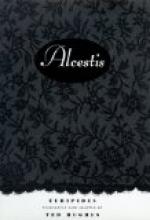Heracles, who rose to tragic rank from a very homely cycle of myth, was apt to bring other homely characters with him. He was a great killer not only of malefactors but of “keres” or bogeys, such as “Old Age” and “Ague” and the sort of “Death” that we find in this play. Thanatos is not a god, not at all a King of Terrors. One may compare him with the dancing skeleton who is called Death in mediaeval writings. When such a figure appears on the tragic stage one asks at once what relation he bears to Hades, the great Olympian king of the unseen. The answer is obvious. Thanatos is the servant of Hades, a “priest” or sacrificer, who is sent to fetch the appointed victims.
The other characters speak for themselves. Certainly Pheres can be trusted to do so, though we must remember that we see him at an unfortunate moment. The aged monarch is not at his best, except perhaps in mere fighting power. I doubt if he was really as cynical as he here professes to be.
* * * * *
In the above criticisms I feel that I may have done what critics are so apt to do. I have dwelt on questions of intellectual interest and perhaps thereby diverted attention from that quality in the play which is the most important as well as by far the hardest to convey; I mean the sheer beauty and delightfulness of the writing. It is the earliest dated play of Euripides which has come down to us. True, he was over forty when he produced it, but it is noticeably different from the works of his old age. The numbers are smoother, the thought less deeply scarred, the language more charming and less passionate. If it be true that poetry is bred out of joy and sorrow, one feels as if more enjoyment and less suffering had gone to the making of the Alcestis than to that of the later plays.
ALCESTIS
CHARACTERS OF THE PLAY
ADMETUS, King of Pherae in Thessaly.
ALCESTIS, daughter of Pelias, his wife.
PHERES, his father, formerly King but now in retirement.
TWO CHILDREN, his son and daughter.
A MANSERVANT in his house.
A HANDMAID.
The Hero HERACLES.
The God APOLLO.
THANATOS or DEATH.
CHORUS, consisting of Elders of Pherae.
“The play was first performed when Glaukinos was Archon, in the 2nd year of the 85th Olympiad (438 B.C.). Sophocles was first, Euripides second with the Cretan Women, Alcmaeon in Psophis, Telephus and Alcestis.... The play is somewhat Satyric in character.”
ALCESTIS
The scene represents the ancient Castle of ADMETUS near Pherae in Thessaly. It is the dusk before dawn; APOLLO, radiant in the darkness, looks at the Castle.




